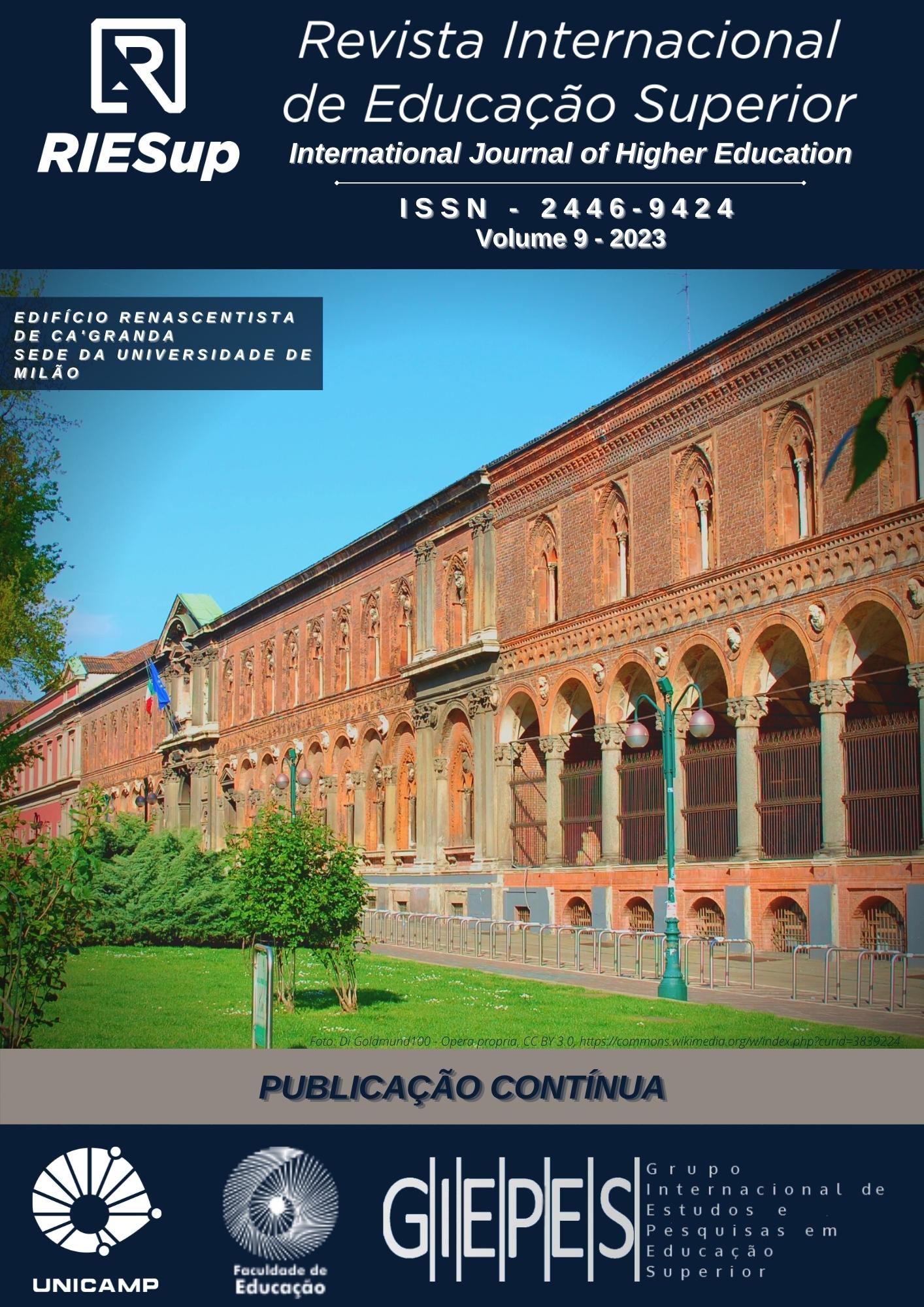Abstract
Introduction: COVID-19 pandemic brought many challenges to education, and amongst them is the adaptation of a majorly practical graduation, the medical education, to a virtual configuration. Therefore, new strategies and tools must be thought to assure that quality will be maintained, and so here will be discussed a few quality indicators of teaching and learning in virtual medical education, with an emphasis on pediatrics. Method: Pubmed, Google Scholar, Revista Brasileira de Educação Médica, Portal de Revistas da USP and Revista da Avaliação da Educação Superior (Campinas) were searched, and there were used 7 inclusion/exclusion criterion to select 16 articles. Results and Discussion: Based on the selected articles, 8 quality indicators are highlighted and discussed below: ‘’Interaction’’, ‘’Assessment Distributed Throughout the Course’’, ‘’Motor Skills Acquisition’’, ‘’Combination of Theory and Practice’’, ‘’Internationalization’’, ‘’Territoriality’’, ‘’Communication Skills Acquisition’’ and ‘’Accessibility’’. Conclusion: Due to the practical character of medicine teaching, there are not many articles that address specifically this issue. Hence, most of the articles presented here do not fit entirely to the virtual teaching of pediatrics, thus further research is needed on this matter. However, it was possible to synthesize the main quality indicators that could serve as a basis for future studies with regard to improving the quality of teaching in pediatrics.
References
BARILLI, Elomar Christina Vieira Castilho; EBECKEN, Nelson Francisco Favilla; CUNHA, Gerson Gomes. A tecnologia de realidade virtual como recurso para formação em saúde pública à distância: uma aplicação para a aprendizagem dos procedimentos antropométricos. Ciênc. saúde coletiva, Rio de Janeiro, v. 16, supl. 1, p. 1247-1256, 2011. Disponível em: https://bityli.com/qCDxv . Acesso em: 23 jul. 2020.
BERTOLIN, Júlio C. G. Indicadores em nível de sistema para avaliar o desenvolvimento e a qualidade da educação superior brasileira. Avaliação (Campinas), Sorocaba, v. 12, n. 2, p. 309-331, 2007. Disponível em: http://www.scielo.br/scielo.php?script=sci_arttext&pid=S1414-40772007000200007&lng=en&nrm=iso. Acesso em: 13 set. 2020.
BILLER, Silke et al. Impact of the Medical Faculty on Study Success in Freiburg: Results from Graduate Surveys. GMS Zeitschrift fur medizinische Ausbildung, vol. 32, n. 4, 2015. Disponível em: https://www.ncbi.nlm.nih.gov/pmc/articles/PMC4606483/. Acesso em: 11 out. 2020.
BRASIL. Ministério da Educação. Secretaria de Educação a Distância. Referenciais de Qualidade para Educação Superior a Distância. Brasília, 2007.
BRASIL. Ministério da Saúde. A aderência dos cursos de graduação em Enfermagem, Medicina e Odontologia às Diretrizes Curriculares Nacionais. Brasília, DF: Ministério da Saúde, 2006.
BRASIL. Lei n. 9.394, de 20 de dezembro de 1996 – Lei de Diretrizes e Bases da Educação Nacional (LDBEN). Estabelece as Diretrizes e Bases da Educação Nacional. Diário Oficial [da] República Federativa do Brasil, Brasília, DF, 20 dez. 1996. Disponível em: http://www.planalto.gov.br/ccivil_03/leis/L9394.htm. Acesso em: 13 set. 2020.
FAGUNDES, Caterine Vila; MUNIZ, Katia Puente; GHISLENI, Ana Cristina. Expansão da educação superior: indicadores de qualidade na modalidade a distância. Imagens da Educação, v. 8, n. 3, 2018.
FÜRSTENBERG, Sophie et al. Medical knowledge and teamwork predict the quality of case summary statements as an indicator of clinical reasoning in undergraduate medical students. GMS journal for medical education, v. 36, n. 6, 2019. Disponível em: https://www.ncbi.nlm.nih.gov/pmc/articles/PMC6905359/. Acesso em: 04 out. 2020.
GALVAO, Malthus Fonseca; MAGALHAES, Albino Verçosa de. Sistema de exercício online para apoio a aprendizagem de Medicina Legal na Universidade de Brasília. Rev. bras. educ. med., Rio de Janeiro, v. 33, n. 1, p. 84-91, 2009. Disponível em: http://www.scielo.br/scielo.php?script=sci_arttext&pid=S0100-55022009000100012&lng=en&nrm=iso. Acesso em: 04 out. 2020.
GIESLER, Marianne et al. Conditions for excellence in teaching in medical education: The Frankfurt Model to ensure quality in teaching and learning. GMS journal for medical education, v. 34, n. 4, 2017. Disponível em: https://bityli.com/cdUSj. Acesso em: 10 out. 2020.
MOROSINI, Marilia Costa et al. A qualidade da educação superior e o complexo exercício de propor indicadores. Revista Brasileira de Educação, Rio de Janeiro, v. 19, n. 57, 2014. Disponível em: http://hdl.handle.net/10923/8647. Acesso em: 13 set. 2020.
NIQUINI, Roberta Pereira et al. Características do Trabalho de Estudantes Universitários Associadas ao seu Desempenho Acadêmico. Educ. rev., Belo Horizonte, v. 31, n. 1, p. 359-381, 2015. Disponível em: https://bityli.com/hD2rq. Acesso em: 13 set. 2020.
NUNES, Enedina Betânia Leite de Lucena Pires; PEREIRA, Isabel Cristina Auler; BRASILEIRO, Tânia Suely Azevedo. A interação como indicador de qualidade na avaliação da educação a distância: um estudo de caso com docentes, tutores e discentes. Avaliação (Campinas), Sorocaba, v. 23, n. 3, p. 869-887, 2018. Disponível em: https://bityli.com/sOguy. Acesso em: 23 jul. 2020.
PERRON, Noëlle Junod et al. How do Swiss medical schools prepare their students to become good communicators in their future professional careers: a questionnaire and interview study involving medical graduates, teachers and curriculum coordinators. BMC Med Educ., v. 18, n. 1, 2018. Disponível em: https://pubmed.ncbi.nlm.nih.gov/30497471/. Acesso em: 17 out. 2020.
UFMG. Departamento de Pediatria. PED1_Orientações_alunos_2020-1_Final.pdf. Acesso no Minha UFMG. Belo Horizonte, 2020. Disponível em: https://bityli.com/Cb9Ke. Acesso em: 23 jul. 2020.
VIEIRA, Vivian Breglia Rosa; TEO, Carla Rosane Paz Arruda. O ensino a distância na formação em saúde. Revista de Educação Popular, v. 17, n. 1, p. 114-125, 2018. Disponível em: http://www.seer.ufu.br/index.php/reveducpop/article/view/40013/pdf. Acesso em: 23 jul. 2020.

This work is licensed under a Creative Commons Attribution 4.0 International License.
Copyright (c) 2022 Rachel Myrrha Ferreira, Clésio Gontijo do Amaral


